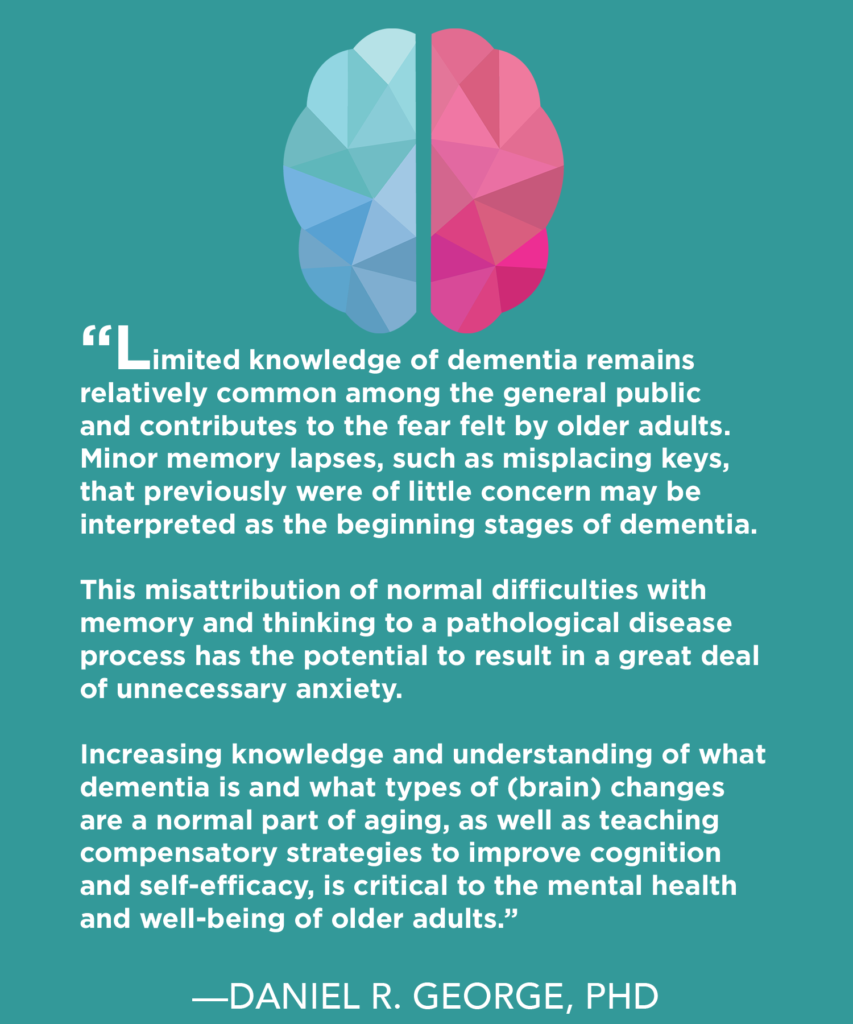Adults are increasingly aware of brain health and are actively seeking to learn and apply scientifically supported strategies in their everyday lives. Staying mentally sharp outranks issues such as Social Security and physical health as a priority in older adults (Marist Institute for Public Opinion, 2012).
In a 2013 AARP study, 70 percent of older adults stated while they preferred to learn from doctors how to keep their brain strong, the dearth of accessible, scientifically-valid information required they instead obtain this information primarily from popular magazines and commercials. This statistic is concerning to advocates, because the content of these messages is likely both purposefully difficult to understand and sensationalized. Corporations whose central motivation is not senior care but selling a product often sponsor these media messages. Such senior-targeted, for-profit tactics not only highlight such organizations’ questionable integrity but perhaps of at least equal concern exponentially increases the risk of financially exploiting one of society’s most vulnerable segments-senior consumers.
 An $8-10 billion marketplace of brain fitness products has developed over the last decade. Supplements, computer games and phone apps promise to maintain and enhance brain functioning and, even occasionally, prevent or reverse brain diseases, including dementia. So-called “smart drugs” that claim to enhance how the brain works have consistently failed and may be unsafe. Empirical support for the efficacy of brain-fitness training programs improving cognition is generally insufficient. These products offer a “one pill/one game” solution based on the misconception that a single intervention stalls the multifactorial processes of brain aging. Experts argue that exaggerated or misleading claims exploit the anxiety of older adults for commercial purposes.
An $8-10 billion marketplace of brain fitness products has developed over the last decade. Supplements, computer games and phone apps promise to maintain and enhance brain functioning and, even occasionally, prevent or reverse brain diseases, including dementia. So-called “smart drugs” that claim to enhance how the brain works have consistently failed and may be unsafe. Empirical support for the efficacy of brain-fitness training programs improving cognition is generally insufficient. These products offer a “one pill/one game” solution based on the misconception that a single intervention stalls the multifactorial processes of brain aging. Experts argue that exaggerated or misleading claims exploit the anxiety of older adults for commercial purposes.
In a recent survey of 1,037 older Americans, memory loss was cited as their No. 1 fear, more so than a fear of being buried alive, fear of snakes, and fear of terrorist attack. The American Psychological Association predicts that dementia-related anxiety is on the rise and may soon become its own clinical disorder.
In 2014, 73 psychologists and neuroscientists from around the world wrote an open letter to companies marketing brain products, stating they are exploiting customers by making “exaggerated and misleading claims” that are not based on sound scientific evidence. The authors concluded with this statement:
Our biggest concern is that older people are making choices, both about how they spend their money and on how they spend their time, based on this kind of information that … is not well-grounded, is a serious concern, and it can feel like people are being exploited.
This one-size-fits-all approach of the current brain health marketplace neglects what brain scientists know to be true. A more science-based approach is needed that educates the public about the genetic and lifestyle factors known to influence brain health throughout a lifetime. In order to experience true brain health, adults must learn to replace the mistruths of the so-called brain fitness industry and be taught science-based recommendations that really work.
We have a responsibility to do better.
Click here for Dr. Sullivan’s Solution
